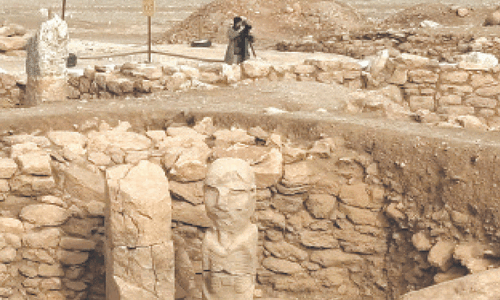BAGHDAD: Militants captured a strategic northern Iraqi city along the highway to Syria on Monday, sending thousands of residents from an ethnic minority fleeing for safety and moving closer to their goal of linking areas under their control on both sides of the border.
US Secretary of State John Kerry said on Monday that American drone strikes are an option in a bid to halt the dramatic sweep by insurgents over a swath of Iraq.
He also said the Obama administration is willing to talk with Iran and does not rule out potential military cooperation between the two rivals to stop the rampage.
Already, the commander of Iran’s elite Quds Force, Gen Ghasem Soleimani, is in Iraq, consulting with officials on how to roll back the Al Qaeda-breakaway group leading the insurgent charge, known as the Islamic State of Iraq and the Al Sham (ISIS), Iraqi security officials said.
They said the US government was notified in advance of Soleimani’s visit.
The officials said that US aircraft have in recent days flown reconnaissance missions over Iraq to gather intelligence on the militants’ positions. Soleimani has been inspecting Iraqi defences and reviewing plans with top commanders and Iranian-backed Shia militias, the officials said.
He set up an operations room to coordinate militias. He also visited the holy cities of Najaf and Karbala south of Baghdad, home to the most revered shrines, and areas west of Baghdad where government forces have faced off with militants for months.
The Islamic State has threatened to march to Baghdad, Karbala and Najaf. Soleimani is one of the most powerful figures in Iran’s security establishment. His Quds Force is a secretive branch of Iran’s Revolutionary Guard involved in external operations. In the mid-2000s’, it organised militias in a campaign of deadly violence against US troops in Iraq, according to American officials.
More recently, it has been involved in helping Bashar Assad in his fight against Sunni rebels. The militants’ capture of Tal Afar on Monday was a key prize, as it sits on a main highway between the Syrian border and Mosul, Iraq’s second largest city, which the Islamic State captured last week. At the same time, further south, Islamic State fighters were battling with government troops at Romanah, a village near another of Iraq’s main border crossings into Syria in Sunni-majority Anbar province, according to a security official in Baghdad.
The Islamic State already controls territory in Syria in several regions abutting the Iraqi border. Its fighters move relatively freely along with money, weapons equipment across the porous, unprotected desert border. But seizing an actual border crossing would be a major symbolic gain for the group as it tries to carve out an enclave bridging the two countries.
Tal Afar, a city of 200,000 located 420 kilometres northwest of Baghdad, is dominated by ethnic Turkomen, who are both Sunni and Shia. That raises fears of new atrocities by Islamic State fighters, who brand Shias as heretics. Over the weekend, the group posted graphic photos purporting to show its fighters executing scores of Iraqi soldiers captured when it overran other areas the past week.
Tal Afar Mayor Abdulal Abdoul said that the city was taken just before dawn. One resident, Hadeer al-Abadi, said militants in pickup trucks mounted with machine guns and flying black jihadi banners were roaming the streets as gunfire rang out. Fighting in the city began on Sunday, with Iraqi government officials saying that Sunni fighters were firing rockets seized from arms depots around Mosul.
They said the local garrison suffered heavy casualties and the main hospital was unable to cope with the wounded, without providing exact numbers. The local security force fled before dawn, and local tribesman who continued to fight later surrendered to the militants, said al-Abadi as he prepared to head out of town with his family. Another resident, Haidar al-Taie, said a warplane was dropping barrels packed with explosives on militant positions inside the city on Monday morning and many Shia families had left the town shortly after fighting broke out on Sunday.
Published in Dawn, June 17th, 2014

































